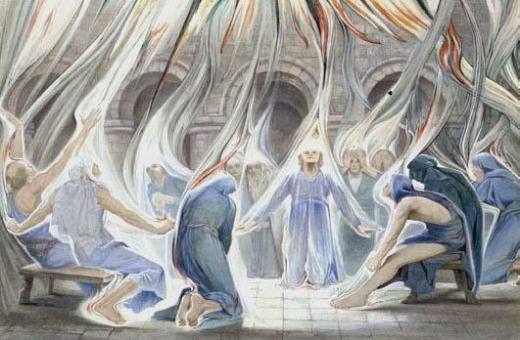 May 5, 2024: Alleluia, Christ is Risen! The Lord is risen indeed. Alleluia! Amen.
May 5, 2024: Alleluia, Christ is Risen! The Lord is risen indeed. Alleluia! Amen.
Some of you know that I received my Master of Divinity from the seminary of Drew University, a Methodist institution. I am very proud of that, as the classes were filled with people from many denominations, cultures, languages, races, and theological points of view. So, as a Drew seminary grad, my Facebook feed was exploding with the posts of former classmates rejoicing in news out of the United Methodist Church General Conference (similar to our General Convention, except theirs are every four years, rather than every three years). For one, the tension and argumentative nature of the meetings were gone. Since the recent departure of those who were steadfast in their belief that homosexuality was “incompatible with Christian teaching,” there was less disagreement and more joy. They also proclaimed that it wasn’t incompatible with scripture to love differently, and they agreed to be in common communion with us, The Episcopal Church.
We experienced a similar thing with regard to inclusion and separation. While our identity is rooted in the via media – the middle way, we too can find that parting is the right path. This middle way, rooted in the beginnings of the Anglican Church – when Roman Catholics and those in the Church of England were killing each other over their beliefs – offers us a framework for loving one another not in spite of our differences, but alongside them.
However, not everyone is able to live in the tension of our differences. When one party in a relationship is insisting on all or nothing, rather than a both/and approach, even after much work toward reconciliation, it is often the loving thing to agree to disagree and separate – allowing each to live in harmony and peace. Because above all, Jesus wants love more than common liturgy, sacramental theology, or doctrine. That is what happened to us in years past, and it too resulted in a more harmonious legislative gathering at subsequent General Conventions.
Now, as far as common communion goes, it does not mean we agree on everything. It means that we agree on the basics. As described by The Episcopal Church, common communion means that “Each [partner]… recognizes the catholicity and independence of the other and maintains its own. Each … agrees to admit members of the other …to participate in the Sacraments. [It]…does not require from either … the acceptance of all doctrinal opinion, sacramental devotion, or liturgical practice characteristic of the other but implies that each believes the other to hold all the essentials of the Christian faith.”[1] We still need to approve it on our end, likely in 2027. And to be clear this is not something that just came on the scene – it has been the faithful work of people in both denominations for many years, and I pray it comes into reality one day.
These intra-denominational splits, and the desire to be in common communion across differences come to mind even more when we consider the scripture this morning from the Acts of the Apostles.
In the passage, we hear that Gentiles and Jews (described as uncircumcised and circumcised) were all listening to Peter preach when the Holy Spirit descended on them all, much to the astonishment of the circumcised. To understand what is going on here, we have to take a step back.
First, we need to know that Peter is one of the circumcised a good Jew (as was Jesus and all of his earliest followers). And, like all good people of faith, he and the other disciples abide by the teachings of their tradition – these include dietary restrictions, circumcision, and laws on what is clean, good and moral. Most of those that they followed we can find today in the books of Leviticus and Deuteronomy – called the Holiness Code. These laws were meant to be followed by all Torah (meaning Scripture) abiding Jewish people. They were not for Gentiles, but were meant to set Jews apart from Gentiles as being the chosen people of God.
These laws were so important to Jews that the earliest followers of Jesus, if not already Jewish, were told that they had to follow them – they had to be circumcised if male, and everyone had to adhere to all the other rules too. In other words, to be considered a true follower of Jesus, you had to first be Jewish, as he was, even if Jesus himself often broke those very laws by healing on the sabbath, eating with defiled hands, and so on.
Now, just before this scene in Acts we hear today, something changes all of that – at least for Peter. As I so as I do every time this passage comes up, here is the Cliff Notes version: A Centurion has a vision that tells him to find some dude named Peter and get him to his house right away. Meanwhile, back at the apostle ranch, Peter is having the weirdest dream – he sees a sheet filling the sky and in it are all these animals he cannot eat according to that code I was telling you about. And God tells him to go ahead and feast on anything he wants. While Peter would sure love to have him some bacon with a side of lobster, being the good Jewish boy that he is responds with “No way God…is this some sort of test?” Yet God insists that whatever God has created cannot ever be deemed unclean by humans, so fire up the grill and eat up Peter.
Now, as I also point out each time – nobody ever asked the animals how they felt about it, but I am guessing they wished God would have told Peter all about the virtues of being a vegetarian. Anyway, just then some folks drop by telling Peter to go to the Centurion’s house, which is a big deal because again, Peter is being told to go somewhere that good Jewish boys (or girls) just don’t go – into the home of a Gentile.
Fast forward and Peter sees that the Holy Spirit is with the Centurion, and like the dream, Peter realizes that human law, even if in scripture, has little bearing on how God actually works in the world. God can do whatever God wants with whomever God chooses. Period.
So, in the passage we heard today, we can now understand why the circumcised folks there just can’t quite understand how the Holy Spirit would descend on “those people.” And if they weren’t Jews originally, but were circumcised in order to follow Jesus, well that would really annoy a person. I mean, they might be thinking – you have GOT to be kidding me. I went through that holy hell of pain and all I had to do was just wait a bit longer and I could have avoided it all together?
And, the newly evolved Peter says back to them, “Can anyone withhold the water for baptizing these people who have received the Holy Spirit just as we have?” Or, put another way – are you trying to argue with what God is doing just because it isn’t what you think God should do?
The thing is, God’s grace doesn’t follow us into the world, we follow it. The Holy Spirit is already active, already present, we just have to be open to seeing it and to being a part of it. And that, as Peter and his followers discovered, is a choice we make. We choose whether we will participate in the on going work of God in the world – and God hopes we do choose to join in.
Unfortunately, we often don’t.
We try to control God. We essentially make the choice not to be a part of God’s work, not to be in relationship, not to love as Christ loved us. And sometimes, we have the audacity to say that God tells us to make that awful choice. And you know what…some even use these same Holiness Codes today to do just that – texts never meant for them – to exclude, deny, and harm.
We must make a different choice. We must choose to love. And the thing is, it won’t always come naturally to us. But, you know who set us an example of choosing to love? Jesus. He said in the passage today “You did not choose me but I chose you.” God chose to come among us, to be with us, to die for us, and then to live for us – that we might know God’s love. God made that choice to show us how to choose to love and to serve, as Jesus commanded us. All followers of Jesus are called to make the choice to love as he loved, and sometimes that means we have to change our relationship with one another in ways we don’t always want, at least initially, because it isn’t how we always did it before. Sometimes it means we join together, and sometimes it means we separate and wish one another well.
And that brings me back to the possibility of common communion with the United Methodists and the splits in both their denomination and our own. Jesus calls us to love one another, and to be one as he and God are one. Yet, the truth is that sometimes the best way for us to love one another, the best way to have relationship with one another, is to let one another go in a different direction, as much as it is to try to join together. This is true for both the Methodists and for us.
In fact, we were once united. Methodist was initially a derisive term applied to John Wesley, his brother Charles, and a few other students at Oxford, who regularly met to pray. They were called that because of their dogmatic or methodical adherence to scripture and worship as a way to reform their church – the Church of England. The Wesleys were preacher’s kids, their father being an Anglican priest, and despite John having been instrumental in forming what would later be the Methodist denomination, he did not advocate for breaking away from the Anglican Church. Still, he laid the seeds for that very thing. And so the Methodist Episcopal Church, as it was first known, split off from the Church of England, and many other splits and reunifications occurred off of that branch of the Jesus Movement in the years since.
We also had our split from the Church of England after the Revolutionary War, and in the many years since. And, more recently, we have also come into common communion with the Lutherans, the Moravians, and a few other denominations. We continue to have dialog with our Roman Catholic sisters and brothers too.
Now, you might think none of this is such a big deal, but it is. It is, because no matter which path one chooses in the Jesus Movement – we all are brothers and sisters in Christ. To act as if one Christian is better than another is absurd and the height of hubris. We can have our disagreements, but we must always choose to love – unconditionally.
The problem is, that many so called followers of Jesus – who unfortunately have grabbed the public microphones of Christian identity – choose a different path. One that excludes, that tries to control the Holy Spirit by making God’s love and grace conditional.
Worse yet is the attempt of some to enforce this conditionality on everyone through a doctrine of Christian Nationalism. Nothing could be more antithetical to the gospel of Jesus Christ than to equate belief in him with civil power. To align Jesus with empire is blasphemous. To sell bibles with national documents contained inside is a sacrilege. We must stand against this at every turn.
So, what can we do?
Well, here is where we, as the Episcopal branch of the Jesus Movement.
Our middle way – our willingness to disagree and still love one another – is something we can teach the world, which seems often to be at one another’s throats., because so many demand that everyone be or think or live just like them. It can be a healing balm across our nation too, where families struggle to even converse at the dinner table because of entrenched political differences.
To live the gospel, is to be willing to enter into relationship with those who are different. It is also to choose to love those who need to go their own way. And it is to evangelize the unconditional love and grace every single day of our lives.
This we must do.
For that is the example set for us by Peter, who opened the door of life to those who had been previously thought to be undesirable and unworthy.
That is how we follow Jesus, who called us to love one another – period. Not just some, but all.
At a time when people of color are killed for the crime of being black, and not believed when they cry out “I can’t breathe!” as once again happened with Frank Tyson (when, oh when, will we believe them Lord!), we can not walk away from our calling!
We must choose to love as Christ calls us and like Peter, follow the work of the Holy Spirit, who calls us into new life, not because we agree with one another, or are the same in any other way, but because we are all children of the same God.
God who loves us all – no matter how we love, what gender we claim, what language we speak, how we pray, the color of our skin, or how we vote.
As proclaimed in the psalm today “Sing to the Lord a new song, for God has done marvelous things,” let us sing a new song of peace, of unity, and most of all, of love.
Love for one another – in our commonality and across our differences.
The harmonies we produce today will, by God’s grace, resound across the world for generations to come, spreading peace where there is war, hope where there is despair, love where there is hate.
Amen.
For the audio, click below, or subscribe to our iTunes Sermon Podcast by clicking here (also available on Audible):
[1] https://www.episcopalchurch.org/ministries/ecumenical-interreligious/meaning-of-full-communion/
The Rev. Diana L. Wilcox
Christ Church in Bloomfield & Glen Ridge
May 5, 2024
The Sixth Sunday Of Easter
1st Reading – Acts 10:44-48
2nd Reading – 1 John 5:1-6
Gospel – John 15:9-17






